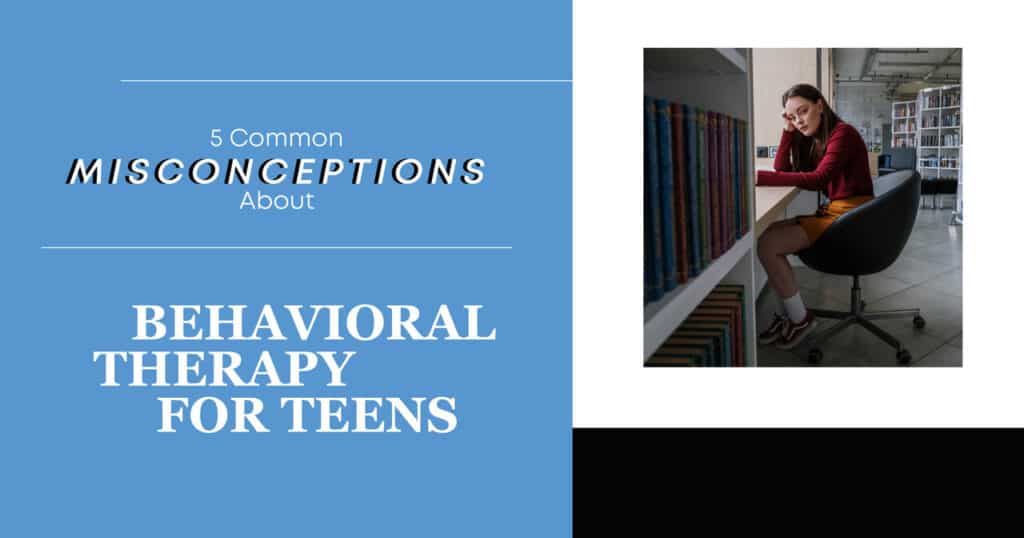Introduction Behavioral Therapy for Teens
Behavioral therapy is a commonly recognized and effective treatment for various mental health issues in teens. However, despite its proven benefits, several misconceptions surround this form of therapy, often deterring parents and teens from seeking help. In this comprehensive guide, we’ll debunk five common misconceptions about behavioral therapy for teens, providing accurate information to help you make informed decisions about mental health care.
What is Behavioral Therapy?
Behavioral therapy focuses on changing negative behaviors through cognitive-behavioral therapy (CBT), exposure therapy, and positive reinforcement. It is designed to help individuals understand and modify their behavior patterns to improve their mental health and overall well-being. Behavioral therapy also integrates techniques from dialectical behavior therapy, especially for teens dealing with borderline personality disorder and post-traumatic stress disorder, ensuring a holistic approach to treatment.
Misconception 1: Behavioral Therapy is Only for Severe Cases
The Reality
One of the most common misconceptions about behavioral therapy is that it is only suitable for severe mental health issues. This belief can prevent teens with mild to moderate symptoms from seeking help.
Suitable for Various Conditions
Behavioral therapy is effective for a wide range of conditions, including:
- Anxiety and Depression: Helps manage symptoms and develop coping strategies.
- ADHD: Assists in improving focus and reducing impulsive behaviors.
- Eating Disorders: Supports healthier eating habits and body image.
- Behavioral Issues: Addresses problems such as defiance and aggression.
Early Intervention
Early intervention through behavioral therapy can prevent mild issues from becoming severe. It equips teens with tools to manage their emotions and behaviors before they escalate, which is particularly beneficial for youth with anxiety disorders and mood disorders. Intensive treatment at residential treatment centers can also be an option for more severe cases, providing an immersive, all-inclusive treatment experience.
Misconception 2: Behavioral Therapy is a Quick Fix
The Reality
Many people mistakenly believe that behavioral therapy provides instant results. While it can be highly effective, it is not a quick fix and requires time and effort.
The Process Takes Time
Behavioral therapy involves:
- Regular Sessions: Consistent meetings with a therapist to address ongoing issues.
- Homework Assignments: Tasks to practice skills learned during sessions.
- Patience and Persistence: Building new habits and thought patterns takes time.
Long-Term Benefits
The skills and strategies learned in behavioral therapy can lead to long-term betterment in mental health and behavior far beyond the duration of the treatment itself. Techniques such as deep breathing exercises and other relaxation techniques are core components that contribute to long-term improvement.
Misconception 3: Behavioral Therapy is Only About Talking
The Reality
Another misconception is that behavioral therapy is solely focused on talking about problems. While discussion is a component, the treatment involves practical, action-oriented techniques.
Techniques Used in Behavioral Therapy
- Cognitive Restructuring: Identifying and changing negative thoughts.
- Behavioral Activation: Encouraging participation in enjoyable activities to improve mood.
- Exposure Therapy: Gradual exposure to feared situations to reduce anxiety.
- Skill Building: Teaching practical skills such as stress management and problem-solving.
Active Participation
Teens are actively involved in the therapeutic process, working on specific goals and practicing new skills in real-life situations. This hands-on approach makes behavioral therapy an effective intervention for dealing with negative emotions and developing positive behavior.
Misconception 4: Behavioral Therapy Stigmatizes Teens
The Reality
Some worry that participating in behavioral therapy will label their teen as “troubled” or “mentally ill.” This stigma can discourage families from seeking necessary help.
Normalizing Therapy
- Common Practice: Therapy is becoming increasingly recognized as a standard and beneficial practice for mental health.
- Positive Framing: Emphasizing therapy as a tool for personal growth and resilience.
- Privacy and Confidentiality: Therapy sessions are confidential, and therapists are trained to handle sensitive issues with care.
Breaking the Stigma
Open conversations about cognitive health and the benefits of therapy can help break down stigma and encourage more teens to seek support. Family therapy sessions can also involve parents and other family members to create a supportive environment and address any family conflict that might be contributing to the teen’s mental health issues.
Misconception 5: Parents Are Not Involved in the Process
The Reality
Another misconception is that parents are excluded from the behavioral therapy process. In reality, parental involvement is often crucial for the therapy’s success.
Collaborative Approach
- Family Sessions: Therapists may include family sessions to improve communication and address family dynamics.
- Parental Support: Parents are taught strategies to support their teen’s progress at home.
- Feedback and Updates: Regular updates and feedback sessions to keep parents informed and involved.
Enhancing Outcomes
Involving parents helps create a supportive home environment that enforces the skills and strategies learned in therapy. This collaborative relationship enhances the overall effectiveness of the therapy process, ensuring that the entire family benefits from the treatment.
The Benefits of Behavioral Therapy for Teens
Improved Mental Health
Behavioral therapy can significantly improve mental health by addressing and managing symptoms of various conditions, including mood disorders and disruptive mood dysregulation disorder.
Enhanced Coping Skills
Teens learn practical coping skills to effectively handle stress, anxiety, and other challenges. These skills include emotion regulation and social skills training, which are crucial for navigating difficult situations.
Better Relationships
Therapy can improve communication and relationships within the family and with peers, fostering healthy relationships and enhancing the teen’s interpersonal skills.
Increased Self-Esteem
As teens develop new skills and see progress, their self-esteem and confidence often increase. This positive change is a core component of the therapy process, helping teens build a healthier self-image.
How to Get Started with Behavioral Therapy
Finding a Qualified Therapist
Look for licensed therapists who specialize in behavioral therapy for teens. Healthcare providers or school counselors can provide helpful recommendations. Social workers and CBT therapists are often well-equipped to handle these cases.
Initial Assessment
The therapist will conduct an assessment to understand the teen’s needs and develop a tailored treatment plan. This initial assessment is crucial for setting the right goals and expectations for the therapy.
Setting Goals
Work with the therapist to set realistic and achievable goals for the therapy process. Clear objectives help guide the treatment and measure progress.
FAQs
Q: How long does behavioral therapy usually last?
A: The duration varies depending on the individual’s needs. Some may benefit from a few months of therapy, while others may require longer-term support.
Q: Does insurance cover behavioral therapy?
A: Many insurance plans cover behavioral therapy, but you should check with your provider for specific and primary details.
Q: Can behavioral therapy be combined with medication?
A: Yes, if recommended by a healthcare provider.
Q: What should we expect during the first session?
A: The first session typically involves an assessment of the teen’s needs and a discussion of therapy goals and expectations.
Conclusion
Behavioral therapy is a powerful tool for supporting teen mental health, but it is often misunderstood. By debunking these common misconceptions, we hope to provide a better understanding of what behavioral therapy entails and its many benefits.
If your teen is struggling with anxiety, depression, or behavioral issues, behavioral therapy offers a structured, supportive approach to improving their mental health and overall well-being. If you or your teen are considering behavioral treatment, contact a qualified therapist to begin the journey toward better mental health.
Empower Teen Mental Health with Behavioral Therapy
If you or someone you know is considering behavioral therapy, don’t hesitate to seek professional guidance. The proper support and a tailored approach can make all the difference in your cognitive health journey.




